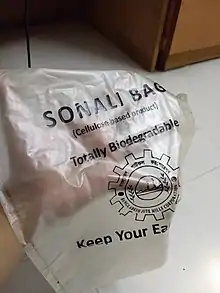Sonali Bag
The Sonali Bag, also known as the Golden Bag, Jute Polymer, or Eco-friendly Poly Bag (in Bengali: সোনালী ব্যাগ), represents a groundbreaking biodegradable bioplastic. Crafted as a sustainable alternative to traditional plastic bags, especially polythene ones, this innovation hails from Bangladesh, thanks to the efforts of scientist Mubarak Ahmad Khan. The primary ingredient in the Sonali Bag is cellulose, derived from jute, a globally cultivated vegetable fiber crop.[1][2][3]

History
In 2002, Bangladesh imposed a ban on polythene bags due to rising environmental concerns.[1][2] This legislative move spurred research into natural fiber composite (NFC) materials as potential replacements for polythene. Mubarak Ahmad Khan, a scientist at Bangladesh Atomic Energy Commission, in collaboration with other researchers from Bangladesh, developed a range of NFC material in a decades-long effort. Subsequently, in 2018, Bangladesh Jute Mills Corporation (BJMC) started the commercial production of Sonali Bag using a Jute-based NFC developed by Mubarak Ahmad Khan.[4][5][6][7][2] The product was named "Sonali Bag" (sonali is Bengali for "golden") by Bangladesh Prime Minister Sheikh Hasina, a nod to jute's denomination as the 'Golden Fiber'.[8]
References
- "Polythene bag from jute". The Daily Inqilab.
- "Polythene substitutes may be jute polymers". The Daily Star. 8 April 2018.
- "Sonali Bags: An Eco-Friendly Alternative". Daily Sun. Retrieved 2018-10-15.
- "Jute Polymer Bag Made In Bangladesh". BBC News বাংলা. 22 April 2018 – via www.bbc.com.
- ‘সোনালী ব্যাগের‘ স্বত্ব রাখতে টাক্সফোর্স গঠনের সুপারিশ [Recommendation of formation of taskforce to remain the owner of the golden bag]. bdnews24.com (in Bengali).
- "Alternative of polythene sonali Bag is coming".
- "Initiatives to preserve the intellectual property of jute 'sonali bag'". The Daily Ittefaq.
- "Polythene bag from jute, contract with UK". Somoy News.